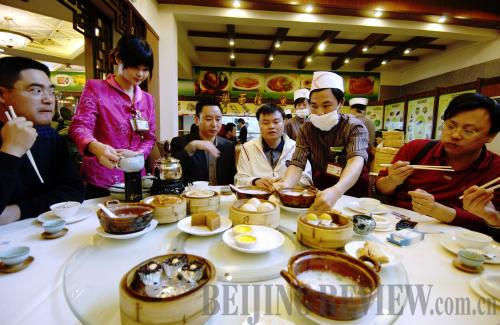|
 |
|
LEISURE TIME: Local residents enjoy morning tea in a Guangzhou restaurant (IC) |
Before coming to China I, like most of my friends and relatives back in the United States, assumed it was one huge, homogenous chunk of land where everyonespoke "Chinese," looked "Chinese," and shared a common culture and history.
Living on-and-off in China since 2007 and traveling throughout much of the country, I canresolutely say that notion is false. Just like in the United States, each geographic region of Chinais distinct with its own cuisine, culture and inmany cases, dialect. Although an overwhelming majority of people, close to 92 percent accordingto government statistics, are Han Chinese, there are 55 other ethnic groups. Some, like the Uygurs in the extreme northwest, look nothinglike the image of the "typical" Chinese person that was burned into my mind before coming.
Now, having just traveled to Guangzhou and Shenzhen in south China's Guangdong Province, I've become aware of another division that shares a parallel with the United States—the distinction between north and south China.
In my experience, if you ask a Chinese northerner, generally north of the Yangtze River, the difference between the north and south, they'll tell you that southerners are more interested in earning money and less interested in politics. They eat rice instead of noodles and steamed buns, don't dine on jiaozi (dumplings) during the Spring Festival, and are generally darker-skinned.
Of course, if you ask a southerner about the north, they're likely to say that northern folk are taller, stronger, and eat heartier food, but are a tad less "cultured." When I asked my Cantonese friend to elaborate on this last point, she cracked a smile and explained that you'd rarely see a southerner "spit on the street" and that they speak softly whereas northerners tend to speak in a forced, blunt tone that makes them sound like they're perpetually angry.
In Guangdong Province, the heart of China's Cantonese culture, I experienced the south at its apex while in Beijing and the northeast I did the same with the north.
Just like in the United States, each region has a rich heritage and culture. In southern states back home, you're likely to hear voices flavored with a Dixie accent and will probably see a confederate flag or two, a remnant of an era that came and went.
In China, I've found that the stereotypes of north and south are, by-and-large, spot on. Like the culture as a whole, southern cuisineis carefully prepared, subtly spiced and neatly served. In the north, food is blasted with flavor and sauce and often served on huge, heaping platters. At southern morning teas, the pace is relaxed and the service slow. The goal is to unwind and relax, a luxury that is often overlooked in the north, I've found.
It's tough to say which culture I like better, but because I've spent most of my time in Beijing, I've become more familiar with and comfortable around northern culture. Still, the warm, subtle south remains alluring.
What's most important is for an outsider to understand that China, like the United States, is far from a homogenous country. Geographic and cultural divisions, north-south included, contribute to making the country a diverse and fascinating whole.
The author is an American living in Beijing |
